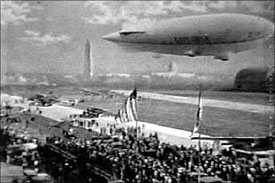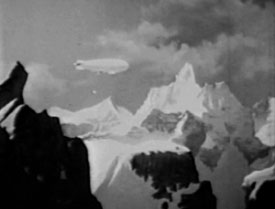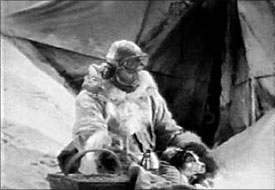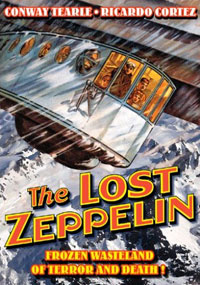 An early "talkie" adventure film, The Lost Zeppelin (1929) takes us on a journey to Antarctica. This is a filmic example of a pulp literature sub-genre of "fantastic flight," which in days before men had been to the North or South Poles frequently regarded airplanes or dirigibles being "first" to cross over or land at one or the other Pole. An early "talkie" adventure film, The Lost Zeppelin (1929) takes us on a journey to Antarctica. This is a filmic example of a pulp literature sub-genre of "fantastic flight," which in days before men had been to the North or South Poles frequently regarded airplanes or dirigibles being "first" to cross over or land at one or the other Pole.
One interesting assumption of the film is that the whole world would be going along on the ride, by means of persistent radio communication to military headquarters, conveyed by commercial radio networks & newspapers to the masses. Rather like all of America glued to their televisions to watch the first Moon Landing live in 1969, we see many scenes in this film of people with ears leaning toward their radios.
However, as one might imagine, lengthy scenes of watching people listen to their radiios can be boring. And between scenes of the airship communicating with military headquarters, HQ informing the public, the public leaning toward radios, adding serial close-ups of newspaper headlines round the world in several languages, then back to people leaning toward their radios...well, The Lost Zeppelin looks to be about thirty percent just that sort of padding.
 Stilted acting, laughable dialogue, & trivial characters keep it from being captivating. Waiting for the zeppelin to enter the story at all is agony. Stilted acting, laughable dialogue, & trivial characters keep it from being captivating. Waiting for the zeppelin to enter the story at all is agony.
The primary "story" is hardly a story at all. The unfaithful wife (Virginia Valli) of the dirigible commander (Conway Tearle) is in love with his best friend & lieutenant who scores the heroic name, Tom Armstrong (Ricardo Cortez). This love-triangle informs the whole story in the most amazingly banal manner.
But when at long last the dirigible Explorer is launched, the portraits of its flight are thrilling. The story & characters remain for the most part inconsequential, but the primitive FX of the dirigible passing through clouds, through storms, & over the icy mountains of Antarctica, these moments though far too brief are loads of fun.
As "fantastic flight" literature was so common in the day, you'd think they could've found some better ideas than the love triangle to make the journey interesting. But very little really happens. They make it through a storm & reach the Pole without incident, while radio & newspapers carrying the news round the world.
 But on the way back, snow & ice weigh down the Explorer which crash lands, never again to rise. As they are crashing we see mainly the radio room informing the world "Falling! Falling! Falling! We are going to crash!" You'd've thought it was actually produced for radio. But on the way back, snow & ice weigh down the Explorer which crash lands, never again to rise. As they are crashing we see mainly the radio room informing the world "Falling! Falling! Falling! We are going to crash!" You'd've thought it was actually produced for radio.
Of a crew of over a dozen, all but two will die off-screen with none of their stories told. The survivors are the captain & his lieutenant together with the captain's dog in a woolen coat. The fate of the dog is more interesting than the fate of the men, not that the dog does much either.
Setting up a camp & waiting to die, they are unexpectedly discovered by a search plane. Alas there is only room in the plain to save one of them. The captain commands his lieutenant to go, because he knows his faithless wife prefers this guy, & he wants his wife to be happy. He asks only that they also save the dog.
The melodrama that fuels the alleged "climax" requires the disgusting wife to realize she really did love her husband all along. This is a poor replacement for anything interesting happening in Antarctica. There is yet one dull "surprise" to come before it's over, but really the only thing worth watching were the measly five or six minutes strung through the film of the zeppelin in flight.
copyright © by Paghat the Ratgirl
|

